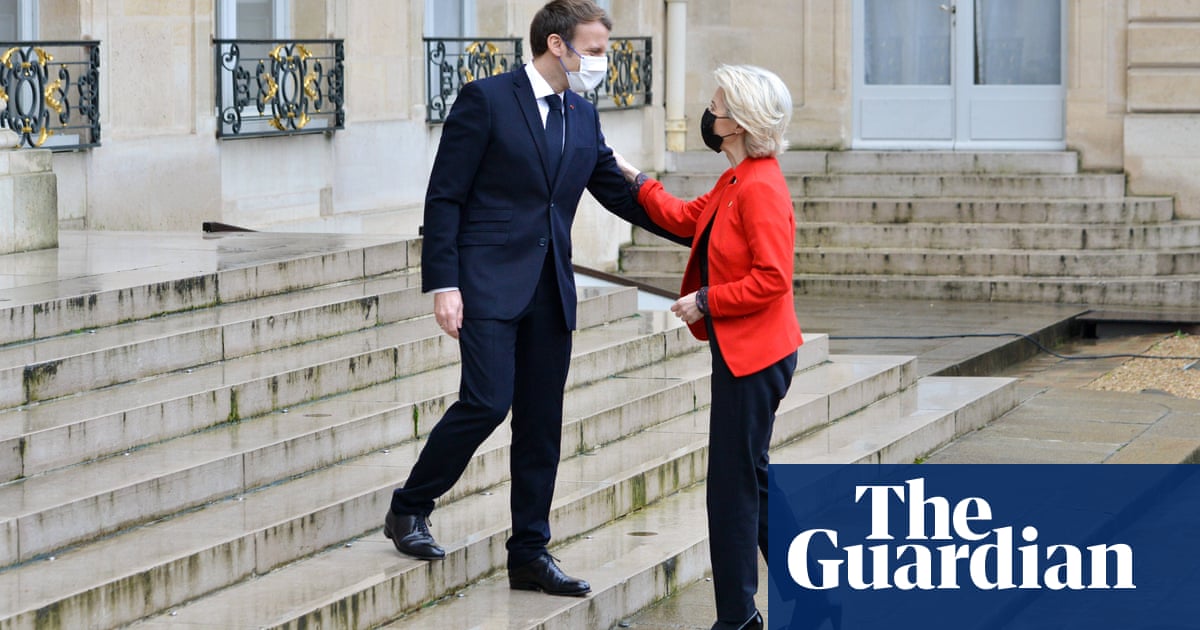Emmanuel Macron has said the EU needs a “frank, exacting” dialogue with Russia to defuse tensions, as he called for new security arrangements on the continent.
The French president was rebuffed by other EU states in June when he and the then German chancellor, Angela Merkel, made a surprise proposal for a summit with Vladimir Putin.
Speaking in Paris at the start of France’s six-month EU presidency, Macron said: “I think that the European Union must have a dialogue with Russia. To have a dialogue doesn’t mean to concede – dialogue means above all to take stock of disagreements.”
In a nod to last summer’s fierce opposition from Poland and the Baltic states to a summit with Putin, he said talks with Russia had to be coordinated among the EU.
Macron said: “I continue to ask for a dialogue that is frank, exacting and coordinated, because member states don’t have the same history with regard to Russia, nor the same geography.”
Russia has massed an estimated 100,000 troops along its border with Ukraine, sparking fears of an invasion.
Macron was speaking alongside the European Commission president, Ursula von der Leyen, who pledged proposals for a new “architecture of European security”. She rejected claims the EU was a bystander in efforts to resolve the security crisis in Ukraine – the bloc has no formal role in a sequence of meetings next week between the US, Russia and Nato, and under the Organisation for Security and Cooperation in Europe.
“It’s very clear: no solution without Europe,” Von der Leyen said.
Macron welcomed US talks with Russia, praising “exemplary” coordination between Europe and Joe Biden’s White House in this matter, a sign of mended fences since the furious row between Paris and Washington over the Aukus submarine and security pact.
The French president said a new security architecture in Europe must take into account the expiry of a cold war-era arms control treaty. The 1987 intermediate-range nuclear forces treaty, which kept nuclear weapons off European soil for three decades, lapsed in 2019 when the US and Russia failed to agree on its future.
“We are no longer covered by the INF treaty, which is a concern to many states, in particular in central and eastern Europe,” Macron said. “We can’t remain in this situation. It’s our responsibility to address it.”
Von der Leyen, a German former defence minister, who was Macron’s choice to lead the EU executive, has called for a more “geopolitical” European Commission. She said she was monitoring with great concern the situation in Kazakhstan, where authorities were using lethal force to quash protests.
“The rights and security of the citizens are of the utmost importance and must be guaranteed,” she said. “I am launching a call for the end of violence, and the European Union stands ready to offer its assistance where it can.”
Earlier in the day, Macron and Von der Leyen visited the Panthéon, the secular mausoleum of prominent French citizens, where they paid tribute to the late Holocaust survivor and celebrated French politician Simone Veil, as well as a founding father of the European project, Jean Monnet.
Veil, the first female president of the European parliament, was buried in 2017 in the Panthéon, the final resting place of the philosophers Voltaire and Jean-Jacques Rousseau, and – since last November – the French-American civil rights activist Joséphine Baker. Monnet, who died in 1979, proposed in 1950 with the French foreign minister, Robert Schuman, a common market in coal and steel for six European nations – the genesis of the EU.
French officials say the EU must become more sovereign in everything from foreign policy, industrial production and management of the pandemic. This means a more assertive stance regarding authoritarian powers such as China and Russia; European production of crucial technologies, such as microchips and medical equipment; as well as exporting vaccines to Africa.
Even Europe’s climate agenda for net zero emissions by 2050 is defined as “environmental sovereignty”, as France seeks a speedy agreement on a proposed CO 2 levy on polluting imports into the bloc.
Member states that seek less economic intervention in the economy, however, are wary of France’s agenda to onshore European production, fearing it could be a form of protectionism against foreign trade.
While French and European officials have extolled EU exports and donations of 1.5bn vaccine doses, critics, such as the former UK prime minister Gordon Brown, have accused the bloc of “commandeering” South Africa’s production of Johnson & Johnson shots.
• This article was amended on 7 January 2022. Veil was the first but not the only female president of the European parliament as stated in an earlier version.
